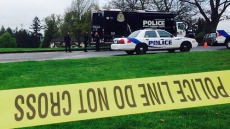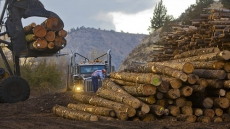HALIFAX — Marcus James said he's been arrested three times while locking up the library where he works in Halifax's historically black north end — twice by police officers he had trained about diversity.
His was one of several concerns fielded by Halifax Regional Police Chief Jean-Michel Blais and two other panellists on Thursday evening during a heated, and at times, confrontational discussion about so-called street checks.
Police released data earlier this year that showed black men in Halifax were three times more likely than whites to be subject to street checks. For many in the crowded room, the numbers confirmed long-held suspicions about racial profiling by police.
But according Blais, the "mistrust" between law enforcement and the African-Nova Scotian community goes both ways.
"I am not denying that there is racism here in Nova Scotia," Blais told the crowd. "People want to change, but we also want to be able to do the job of being able to help our communities."
A January report from the Halifax RCMP — which patrols certain parts of the Halifax Regional Municipality — found that in the first 10 months of 2016, 41 per cent of 1,246 street checks involved African-Nova Scotians.
The Halifax Regional Police figures showed that of the roughly 37,000 people checked between 2005 and 2016, almost 4,100 were black, despite making up only 3.59 per cent of the municipal population, according to the 2011 census.
Both Nova Scotia's premier and Halifax's mayor have voiced concerns about the numbers.

Blais said Thursday that records of the 68,400 street checks conducted over that period suggest 91 per cent of them can be linked to individuals who have been charged with a crime.
The police chief defended street checks as a necessary information-gathering policing tool, and said community concerns must be wedded to broader issues of criminality. Of the 12 homicides in Halifax in 2016, he said seven of the victims were black males.
"I'm just wondering if whether or not the issues ... are not necessarily the result of street checks, but are the results of the other issues that are in our societies," Blais said. "Community policing isn't really playing basketball ... (it's) sitting down and saying, 'We have a problem.'"
Panellist and clinical social worker Lana MacLean, who said she is regularly stopped by police, argued that this strategy is based on a presumption of guilt by association that effectively criminalizes blackness.
"The black community is intimately connected to each other," said MacLean. "It's a trickle-down impact in terms of the individual, their family, the community.
"If you're treating me like a criminal ... then I may as well behave like one. And those behaviours are seen as being oppositional, when in fact, some of them are protective."
Blais acknowledged that police forces include people who bring their own biases to every interaction. Likewise, he said, people on the receiving end of a police encounter may seek explanations to justify what they see as unfair treatment.
These divergent views were magnified during a tense question-and-answer session in which members of the crowd interrupted speakers to lob complaints against the police, at one point even calling for Blais to resign.
During a particularly contentious exchange, Blais asked a questioner what level of street checks he would find acceptable, to which several members of the audience replied, "zero."
While Blais acceded to a proposal to provide advocates for people who file discrimination complaints against police, he demurred at the suggestion that Halifax adopt more stringent street check regulations like those recently implemented in Ontario.

After three hours of dialogue, both sides remained steadfast in their points of view. In some ways, the search for common ground seemed more distant than before, but all agreed that broaching the difficult subject of police relations with minorities was a first step towards ensuring the wellbeing of the community as a whole.
"As we've seen in the room, there's so much happening in the hearts of people in dealing with this issue that we can get to the place where we're talking about more than the problem, but the solution," said panellist Rickcola Brinton of Nova Scotia Legal Aid. "The discussion didn't start here, and the discussion won't end here."



